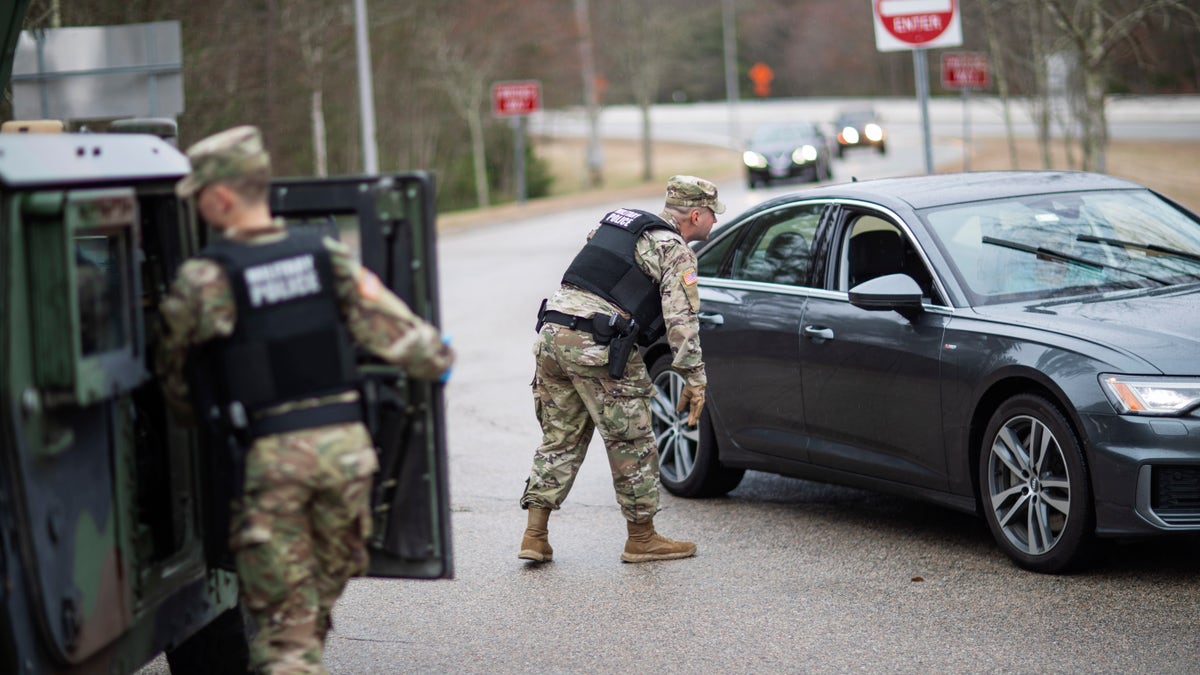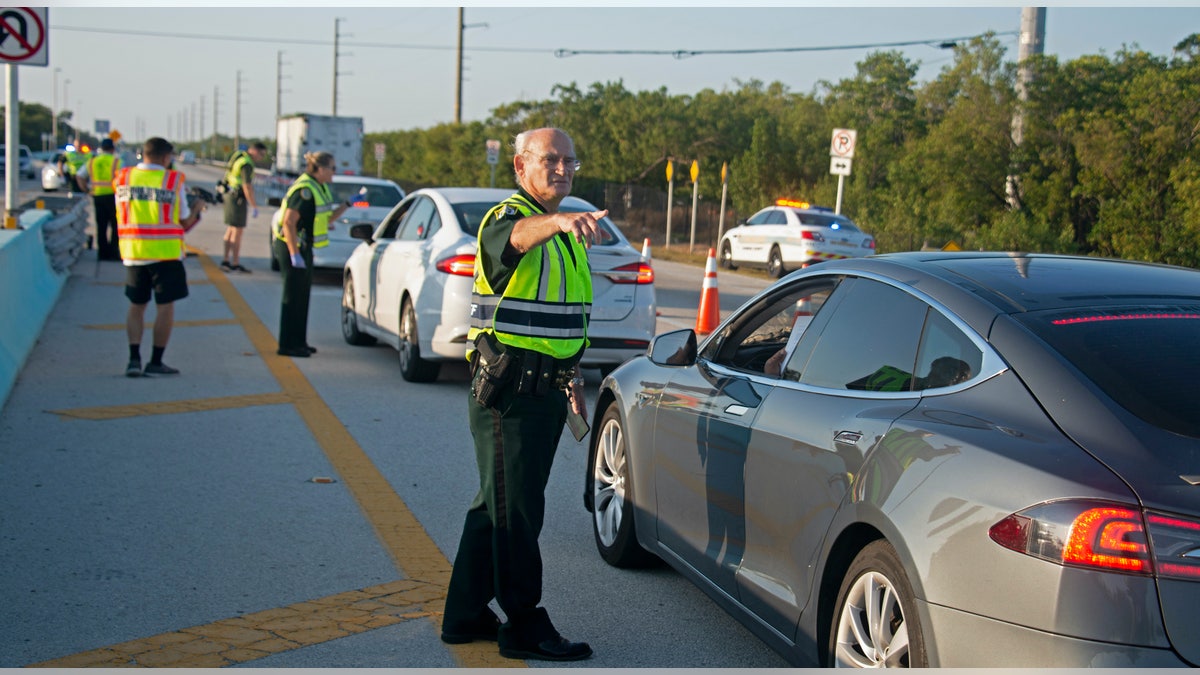Michigan protesters hold in-vehicle rally against Gov. Whitmer
Grady Trimble reports on 'operation gridlock' in Lansing, Michigan to protest Governor Gretchen Whitmer's expanded stay-at-home order
Get all the latest news on coronavirus and more delivered daily to your inbox. Sign up here.
State and local governments have taken extraordinary measures to slow the spread of the coronavirus in recent weeks, including by closing down restaurants and places for public gatherings -- but they've also drawn a backlash with efforts seen by some as overly aggressive or even unconstitutional.
One of the focal points of these complaints has been vehicle checkpoints, as states increasingly harden their own borders in a bid to restrict travel from regions hard-hit by the virus.
One of the earliest states to implement travel restrictions was Rhode Island, which mandated that people coming from New York, the epicenter of the pandemic in the U.S, self-isolate for 14 days. The state used the National Guard to go door-to-door informing people of the requirement, as well as police officers monitoring highways and transportations hubs, according to the New York Times, before later expanding its order to cover people "coming to Rhode Island from another state for a non-work-related purpose."
Rhode Island Democratic Gov. Gina Raimondo sternly defended her state's actions, especially after New York Democratic Gov. Andrew Cuomo threatened to sue -- but the Rhode Island chapter of the American Civil Liberties Union panned the "enormous breadth" of the order.

A member of the Rhode Island National Guard Military Police directs a motorist with New York license plates at a checkpoint on I-95 over the border with Connecticut where New Yorkers must pull over and provide contact information and are told to self-quarantine for two weeks, Saturday, March 28, 2020, in Hope Valley, R.I. (AP Photo/David Goldman)
DRIVERS SWARM MICHIGAN CAPITAL TO PROTEST CORONAVIRUS LOCKDOWN MEASURES
"The ACLU remains very concerned about the enormous breadth of the Governor's latest directive and its focus on out-of-staters at a time when the state acknowledges that half of Rhode Islanders themselves are not following social distancing rules," state executive director Steven Brown said in a statement, which is linked to from a section of its site that sums up the organization's efforts to protect "Fourth Amendment rights."
Brown continued: "In addition, targeting out-of-staters like this can only promote a divisive ‘us vs. them’ mentality that encourages vilification of others. We fully appreciate that the state is dealing with an emergency crisis that requires emergency actions, but it should not be at the unwarranted expense of our civil rights."
Rhode Island is far from the only place that's issuing strict restrictions on travel.
Florida was also one of the first states to restrict travel by car from other states, setting up checkpoints on its borders, particularly on Interstate 10 and Interstate 95, routes commonly used by travelers from the New York area. People are required to “self-declare” where they’re traveling from, and their names and addresses are recorded, the Orlando Sentinel reported. They are also asked to self-isolate for 14 days upon arrival in Florida or risk spending 60 days in jail.

In this photo provided by the Florida Keys News Bureau, Monroe County Sheriff’s Office Col. Lou Caputo directs a driver wanting to continue down the Florida Keys Overseas Highway near Key Largo, Fla. Friday, March 27, 2020. The Keys have been temporarily closed to visitors since March 22, because of the coronavirus crisis. Keys officials decided to established the checkpoint Friday to further lessen the threat of virus transmission to people in the subtropical island chain. (Andy Newman/Florida Keys News Bureau via AP)
The Florida Keys have imposed their own restrictions, with nonresidents being turned away by police checkpoints.
Police in Delaware are using checkpoints to find out-of-state drivers and turn them back if possible. At one shopping center, police stopped drivers without Delaware plates and would not allow them in if they did not have "essential business," according to Delaware Online.
Meanwhile, a group of homeowners is suing Dare County, N.C. -- which encompasses much of the Outer Banks -- where checkpoints along major highways require drivers to produce a North Carolina driver’s license or a "Permanent Resident Permit" to proceed across one of the two bridges that access the Outer Banks area.
HOMEOWNERS SUE OVER RESTRICTED ACCESS TO OUTER BANKS SECOND HOMES DUE TO CORONAVIRUS
A bulletin posted on the county's website in mid-March states that "checkpoints will be established at entry points to Dare County and no visitors will be allowed access. ... Visitors will not be allowed to travel through Dare County to access Currituck County (Corolla), Hyde County (Ocracoke Island), or Tyrrell County. People who reside, own property or work in Corolla or Ocracoke will be allowed entry. "
Those restrictions brought on a lawsuit from homeowners in the county who normally live out of the state and are being denied access to the property they own in the Outer Banks.
"If not enjoined by this Court, Dare County will continue to discriminate against the Plaintiffs, and deprive them of their Constitutional rights," the suit reads. "The Plaintiffs will suffer irreparable injury due to the deprivation of Constitutional rights."
Dare County's checkpoints were set up before there were any confirmed coronavirus cases in the county. As of Wednesday, the county is only reporting 15 total confirmed cases.
TRUMP'S NAME TO APPEAR ON CORONAVIRUS STIMULUS CHECKS SENT TO AMERICANS
All of this comes as protesters -- socially distanced in their vehicles -- descended on Lansing, Mich., Wednesday to rally against Democratic Gov. Gretchen Whitmer's strict stay-at-home order which many said went too far. For example, parts of stores have been forced to close down because certain items were deemed non-essential.
"You can't buy paint. You can't buy lawn fertilizer or grass seed. C'mon. All -- statewide? Really?" one protester said Wednesday.
Additionally, protests in Ralegh, N.C., organized with the hashtag #ReopenNC, were shut down by police on Tuesday, according to WTVD. Townhall columnist Mike S. Adams said on Twitter that he believed protesters' rights were being violated.
"Police officers in Ralegh declared protest a non essential activity," he said. "We no longer have a first amendment right of peaceable assembly. This is why we have a second amendment."
Adams continued criticizing the North Carolina government's coronavirus orders on Wednesday.
"A governor’s executive order does not suspend or negate the United States constitution," he said.
CORONAVIRUS STAY-AT-HOME ORDERS STIR PROTESTS NATIONWIDE AMID FEARS OF ECONOMIC COLLAPSE
States and local governments have sweeping police powers to preserve public safety, but they can still run up against the Constitution if they are limiting peoples' rights -- like the right to assembly, the right to not be discriminated against or the protection against unreasonable search and seizure.
Those government actions, if challenged in the courts, could very well be tested under a standard called "strict scrutiny" because of the fundamental rights they restrict. Strict scrutiny forces a government to prove that its actions further a compelling government interest and that they accomplish its goal through the least restrictive means possible.
President Trump's most recent nominee to the D.C. Circuit Court, Judge Justin Walker, ruled against the Louisville government in a strict scrutiny case last week after it banned a drive-in Easter Sunday service.
"And as above, banning drive-in church services isn’t the least restrictive means to advance Louisville’s interest in preventing the spread of coronavirus," Walker wrote in his opinion for the U.S. District Court for the Eastern District of Kentucky. "Moreover, if sitting in cars did pose a significant danger of spreading the virus, Louisville would close all drive-throughs and parking lots that are not related to maintaining public health, which they haven’t done."
CLICK HERE TO GET THE FOX NEWS APP
Walker did acknowledge in his opinion, however, that governments are largely doing what they can to do right by their citizens, even if in the midst of the national crisis it is unclear what the right thing is.
"There is no instruction book for a pandemic. The threat evolves. Experts reevaluate. And government officials make the best calls they can, based on the best information they have," Walker wrote.
"Sometimes those government officials will disagree. The Mayor of Louisville, in this case, wants to save lives," he continued. "The state Attorney General, to pick one example of an official who disagrees with the Mayor, surely shares the Mayor’s concern for the public’s health. ... And neither leader, the Court feels confident, is acting with malice toward the physical or spiritual health of On Fire’s congregation."
Fox News' Danielle Wallace, Grady Trimble, Andrew O'Reilly and Peter Aitken contributed to this report.














































